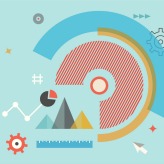 Most companies measure and gauge their performance and success by analyzing data. And the fact that we humans are visual creatures means our ability to interpret visual data tends to be far greater than with written words. This is the reason most businesses turn to dashboards as a business intelligence tool to present data in a way that’s easy to understand. Dashboards have become a critical part of any analytics process. Here are some common uses of dashboards across various business functions.
Most companies measure and gauge their performance and success by analyzing data. And the fact that we humans are visual creatures means our ability to interpret visual data tends to be far greater than with written words. This is the reason most businesses turn to dashboards as a business intelligence tool to present data in a way that’s easy to understand. Dashboards have become a critical part of any analytics process. Here are some common uses of dashboards across various business functions.
Marketing insights
The marketing department in an organization typically analyzes a significant amount of data from various channels. Whether the purpose is to forecast monthly sales, predict trends, or build marketing strategies, marketing officers need to compare, sort, and analyze raw data in order to present it in an understandable format using dashboards. Once raw data has been polished into meaningful information and presented to business executives, key decision makers are able to make choices based on that information.
Tracking sales opportunities
Sales dashboards are perfect for tracking various products and services throughout their lifecycle. With sales dashboards, you can identify sales opportunities by monitoring top-selling products and comparing the growth in revenue on a periodical basis. The implementation of sales dashboards eliminates the need to spend hours manually entering data and preparing sales reports, spreadsheets, charts, and manual data.
Social media management
There’s more to social media management than posting regularly on your business’s social media accounts. And in most cases, the default dashboard offered by your social media platform doesn’t give you a deep insight into your social media campaigns. What’s more, managing multiple social media accounts can quickly become a cumbersome process since you have to use several login credentials. That’s where dashboards come in. You can manage your accounts all at once through a comprehensive social media dashboard, saving you valuable time and effort.
Financial reports
Presenting financial data is so complex that, if not handled by competent employees, will often lead to misinterpretation and misunderstanding of critical data. Dashboards make creating financial reports much easier, and financial analysts can take advantage of dashboards to display sensitive data in a comprehensible graphical format – be it customer invoices, progress toward revenue goals, or business expenses.
Project collaboration
Businesses of all sizes require their employees to collaborate on projects, whether it’s on-site or online. Project supervisors need to get their teams together, in order to give them an insight of the projects’ requirements, deadlines and responsibilities, and to learn about the projects’ progress. With the help of project collaboration dashboards, members will see the complete workflow of the project, allowing for a more efficient and collaborative working environment.
Dashboards can truly take away the complications of presenting complex business data. If you’re looking to implement business intelligence tools to simplify your company’s data analysis process, drop us a line today and we can help.